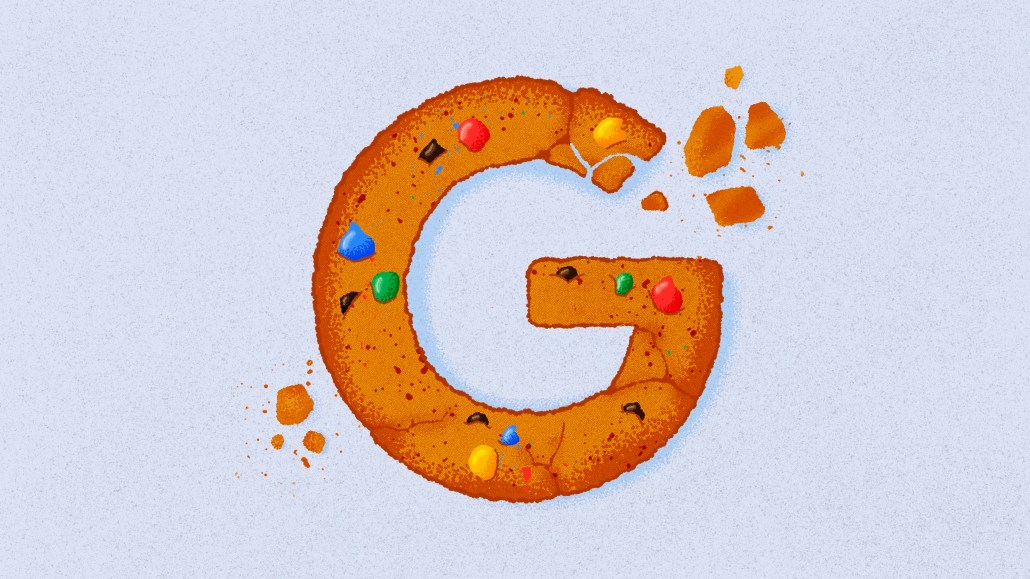Secure your place at the Digiday Media Buying Summit in Nashville, March 2-4
Research Briefing: Brands are much less concerned this year about the end of the cookie

This research is based on unique data collected from our proprietary audience of publisher, agency, brand and tech insiders. It’s available to Digiday+ members. More from the series →
Interested in sharing your perspectives on the media and marketing industries? Join the Digiday research panel.
Welcome to the Digiday+ Research Briefing, your weekly curation of media and marketing research insights. Digiday+ members have access to the research below.
In this edition, we share focal points from Digiday’s recently released report on how concerned brands are (or aren’t) about the death of the third-party cookie.
Half of brand pros worry about their ability to target ads post-cookie, down from 71% last year
The second half of the year is rolling, which means we’re getting closer to the actual beginning of the end of the third-party cookie. Brands are actively preparing for that impending reality, with many of them betting on first-party data as the top alternative to cookies. But marketers aren’t as worried about targeting and measuring ads in the post-cookie world as you might think, especially in the case of brands. This is according to a Digiday+ Research survey of 88 brand and agency professionals.
In the second quarter of 2022, nearly three-quarters of brand pros (71%) told Digiday they agreed they worried about their ability to target ads without cookies. In Q2 2023, that percentage fell to half (50%). At the same time, the percentage of brand pros who said they worry about their ability to measure ads without cookies fell from 84% in Q2 last year to just short of two-thirds (65%) in Q2 this year.
Key findings:
- Far fewer brand pros think the end of third-party cookies will hurt their business than last year. Slightly more than half of brands (52%) agreed in Q2 last year that their business would hurt in a post-cookie world. This year, fewer than one-third (31%) said the same. What’s more, not one brand respondent to Digiday’s survey this year said they agree strongly that the end of the cookie will hurt their business, while 10% said so last year.
- Overall, agency pros are still worried about targeting and measuring ads in a post-cookie world, but their worries are relatively unchanged from last year. More than half of agency pros (57%) said in Q2 this year they agree that they worry about their ability to target ads without third-party cookies vs. 53% last year. More than two-thirds (67%) said they worry about their ability to measure ads this year, slightly less than the 68% who said so in 2022.
Research Rewind: Agencies choose contextual targeting over first-party data in post-cookie era
Because agency pros are still worried about their abilities to target and measure ads after the death of the third-party cookie, they are taking their preparations for a post-cookie world seriously. The percentage of agencies preparing for the end of the third-party cookie has been steadily increasing over the last two years, according to a Digiday+ Research survey of 56 agency professionals in the second quarter of this year.
In Q1 2021, 62% of agency pros told Digiday that they agreed somewhat or strongly that their businesses were actively preparing for a cookieless future. That percentage grew to 68% in Q3 2021, and again to 71% in Q2 2022, before hitting 73% in Q2 of this year.
In case you missed it, most agencies are looking to contextual targeting as the way forward.
Key findings:
- Almost three-quarters of agency pros (70%) said in Q2 2023 they are spending more on contextual targeting campaigns to prepare for the end of the third-party cookie, up from 47% a year ago. That puts contextual targeting well ahead of other alternatives, such as revising measurement and attribution frameworks, which came in second.
- Agencies appear much less interested in first-party data than brands. Sixty-nine percent of brand pros said they’re investing in technology to acquire more first-party data this year, making it the most popular cookie alternative option among brands. In comparison, just 39% of agency pros said the same, down from 45% last year.
Read full report
See research from all Digiday Media Brands:
More in Marketing

Future of Marketing Briefing: AI’s branding problem is why marketers keep it off the label
The reputational downside is clearer than the branding upside, which makes discretion the safer strategy.

While holdcos build ‘death stars of content,’ indie creative agencies take alternative routes
Indie agencies and the holding company sector were once bound together. The Super Bowl and WPP’s latest remodeling plans show they’re heading in different directions.

How Boll & Branch leverages AI for operational and creative tasks
Boll & Branch first and foremost uses AI to manage workflows across teams.








